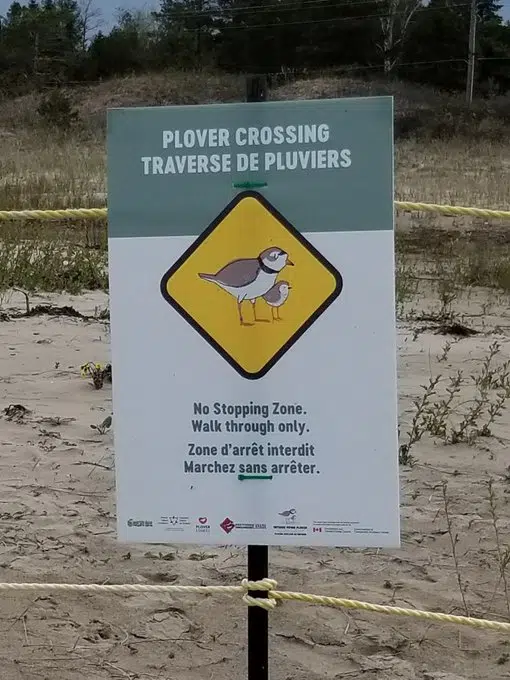The Town of South Bruce Peninsula will hold a closed council meeting Thursday (April 28) to determine the path forward after losing its latest appeal in its legal battle over Piping Plover habitat.
Mayor Janice Jackson says the Town is “deeply disappointed” with the outcome.
The Piping Plover is an endangered shore bird that is protected by the Endangered Species Act.
In 2018, the Town was charged by the Ministry of Natural Resources and Forestry (MNRF) because it mechanically raked the beach in April of 2017 before the plovers arrived for the season. It also graded the beach with large machinery after the plovers had left at the end of that season.
The legal issue arises out of the argument that beach raking could destroy plover habitat.
The Town argued it had shared its beach maintenance plans with the ministry and heard no objection about it from the ministry, but the MNRF said the work exceeded what had been proposed and had damaged plover habitat.
The Town was found guilty of those charges on October 3rd, 2019. It filed an appeal on October 7th 2019.
The Town appealed the convictions, making the arguments that the trial justice erred in his interpretation of “damage,” and also in interpreting “habitat.” The Town also argued the trial justice erred in qualifying Ms. Suzanne Robinson, a Ministry of Natural Resources biologist as an expert because she worked for the MNRF.
In December 2019, the conviction was upheld and the Town was ordered to pay Birds Canada $100,000 as part of its guilty verdict, but the court did allow for a slight change in the scope of Sauble Beach that makes up the ‘habitat.’
This most recent appeal again, argued the courts erred in their interpretation of the word “damage,” saying the Justice used a dictionary definition of ‘damage’ that was too broad, and again, argued the courts should not have accepted the opinion of a Ministry of Natural Resources [MNR] biologist, claiming she was not impartial and independent.
Three Justices, Pardu, Lauwers and Sossin agreed to dismiss the Town’s appeal on Friday (April 22nd, 2022).
Justice Pardu wrote, “I do not accept the argument of the appellant that there was no evidence of any link between the actions of the Town and any effect on the Piping Plover habitat.” Pardu continued, “The Piping Plover urgently needed food when they arrived in April if they were to successfully nest and reproduce. The deep raking and turnover of the soil just before they arrived made the invertebrates upon which they depended as a source for food unavailable to them. The removal of wrack and vegetation from the shoreline deprived them of that source of camouflage and shelter. The work in August to September altered sensitive areas on the shore upon which the Piping Plover depended. The foredunes might take many years to recover.”
She added, “In any event, the work done by the appellant went well beyond that performed in earlier years, in consultation with the MNR, and cannot be characterized as a minimal interference with the Piping Plover habitat.”
On the Town’s second point of appeal, having to do with biologist Suzanne Robinson’s suitability as an expert in the case, the Town had argued Robinson’s involvement with the investigation made her an unsuitable expert. The Town pointed to Robinson’s involvement with maintenance at Sauble Beach, her past advice to the Town and expectation that it be followed, her involvement with the investigation and ministry officers who laid the charges, and her expression of opinion that the 2017 beach maintenance was damage, without physically going to the beach to see it firsthand, as well as her involvement with a 2018 stop work order.
Overall, Justice Pardu sided with the previous two court decisions, that Robinson was indeed suitable as an expert. Pardu wrote that Robinson had been working on the protection of Piping Plovers for the MNRF since at least 2008, and had also presented to Town Council about beach maintenance
The Town had also argued that Robinson had an over-zealous attitude towards prosecution and used the example of Robinson’s willingness to work on her report in the case while on maternity leave. Justice Pardu disagreed, writing, “For some, working at home on a report while on maternity leave might be indicative of a conscientious work ethic.” Justice Lauwers added, “The appellant’s submission that this was a sign of bias is both plainly absurd and offensive.”
Pardu noted, that leaving aside the question of Robinson’s expert opinion, “In any event, the trial judge was entitled to and did accept the evidence of the other prosecution expert, Dr. Francesca Cuthbert, who concluded that the Town’s actions in April 2017 and August to September 2017 damaged the habitat…” adding, “Her expertise to give opinion evidence about the Piping Plover, their habitat and the effect of the Town’s actions was undoubted.”




